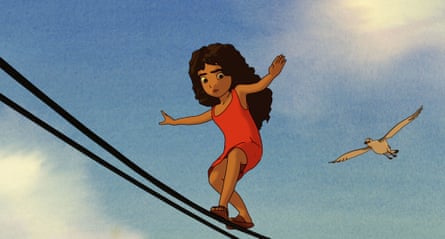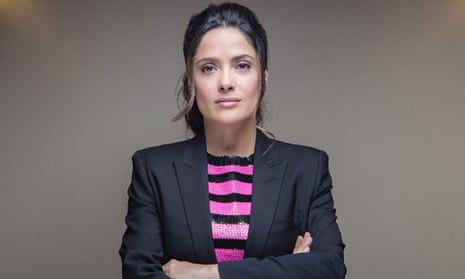Unsisterly though it sounds, I didn’t expect to like Salma Hayek very much. Because we both go to a lot of catwalk shows, I see her all the time: I’m there as a reporter, and she’s there because her husband Francois-Henri Pinault is the CEO of Kering, the luxury group that owns Gucci, Saint Laurent, Stella McCartney, Alexander McQueen and Bottega Veneta, among others. There, she rocks a kind of boss’s wife vibe, dressed to the nines in the designer’s clothes. Or at least that’s how it had always come across to me. And I’d watched her new film, an animation of Kahlil Gibran’s The Prophet, aimed at families: a “passion project” that is charming, beautifully crafted, impeccably well-intentioned – but, nonetheless, could perhaps do with wearing its learning a little more lightly.
Expecting grandeur, I am a little taken aback to arrive at the Park Cafe, appointed by Hayek’s people for our interview, to find it isn’t an ironically named smart restaurant, as I had assumed. It’s the kind of cafe where you queue with a plastic tray, next to a noticeboard of flyers for Monkey Music and community gardening projects, for a polystyrene cup of PG Tips with the teabag left in. It’s not quite somewhere I can picture Hayek – Oscar nominee, billionaire’s wife, Hollywood bombshell – hanging out, so I wait outside. Sure enough, when she arrives – tiny, radiant, swathed in cashmere, flanked by a bodyguard and an assistant who is being dragged along by Hayek’s golden labrador, Lolita – it turns out this isn’t the place she had in mind. But she’ll show me the way, she says, leading me in the direction of a restaurant elsewhere in west London’s Holland Park, chatting merrily about nothing in particular – the weather, Milan fashion week, how she needs a coffee.
The Belvedere Restaurant is quiet and serene, with white tablecloths and stem vases on the tables. But it is mid-afternoon, and the place is just about to close, the cloakroom attendant explains. Hayek asks very nicely: could we perhaps just have a coffee? But the attendant, who doesn’t recognise her, politely shows us the door. Hayek seems quite relaxed – it’s a nice day for a walk in the park, she says.
Well, yes, except there is a howling wind that means I won’t be able to record our conversation, and it’s too chilly to sit outdoors, so I duck back into the restaurant, find the manager, and explain that Hayek is a huge movie star. He looks past me, out of the window, and sees her just as she tips her perfect profile upwards to the early spring sunshine like a leading lady finding her spotlight. Immediately he ushers us to a table by the leaded windows overlooking the park. On International Women’s Day, Hayek will present the UK premiere of The Prophet as part of Southbank Centre’s Women of the World festival. Hayek sees the message of the book as particularly important to women, because it is “about the courage to speak up, to believe you are worth being listened to,” she says. Gibran’s classic has sold over 100m copies worldwide, in 50 languages, since it was first published in 1923. “And yet it has never had publicity. It’s been read by generation after generation without ever really having fame. It’s not a religious book, it’s poetic and philosophical. It’s a book written by an Arabic man, which unites all religions. That itself I think is important.”

Hayek was a late bloomer, personally and professionally. She became a mother at 41 and married 18 months later. She was born into an affluent, cultured Mexican family, with Lebanese ancestry. Her father was an oil executive who once ran for mayor of their port city of Coatzacoalcos, her mother an opera singer who funded a music programme for less well-off children. At 25, already a television star in Mexico, Hayek moved to Hollywood, only to find that “no one would hire me”. She told Vanity Fair, a decade later: “I had studio heads say to me, ‘You could have been the biggest star in America, but you were born in the wrong country. You can never be a leading lady, because we can’t take the risk of you opening your mouth and people thinking of their maids.’” Alfred Molina, who played Diego Rivera to Hayek’s Frida Kahlo in the 2002 biopic she produced and which earned Hayek her Oscar, Golden Globe and Bafta acting nominations, said that “If Salma were white and male, she’d be bigger than Harvey Weinstein.” Weinstein himself called her, admiringly, “a ball-breaker”.
Frida, which Hayek spent eight years getting made, changed perceptions yet failed to bring on the meaty roles she might have hoped for. Since, she has executive-produced the award-winning Ugly Betty TV series, taken some comedy roles in Adam Sandler movies, and voiced Kitty Softpaws in Puss in Boots.
Aged 48, she has five films scheduled for release in 2015. She is still gorgeous, with an insanely voluptuous body on a tiny frame, less than 5ft 2in tall, with delicate little wrists and hands. Her face is cartoonlike in its perfectly symmetrical beauty. Her accent varies, sometimes a patrician, Euro-veneer – she is based in London, where her daughter is at school, but the family spend a lot of time at their country house just outside Paris – and then dipping into a sing-song, Jenny-from-the-block Latina accent that she puts on for effect when throwing off one of her saltier asides. Today she is wearing a navy Gucci coat with a Bottega Veneta scarf, over an Alexander McQueen fitted sweater and white shirt, and pin-striped trousers. “And the most important thing, the thing you don’t see,” she says, dropping her voice half an octave and raising an eyebrow half an inch: “Stella McCartney undergarments. So beautiful, so comfortable, so well made. This is important, no? But I can’t believe we are talking about undergarments! I won’t tell you the colour at least!”
Two years ago, Hayek co-founded Chime for Change, in aid of women’s and children’s health and education worldwide. Current projects include building schools for Syrian refugees in Turkey and Lebanon, and fundraising support for a female inventor who has come up with a cheap-to-produce incubator for under-resourced maternity wards in the developing world. She describes herself as an activist for women, but there was an odd episode last year when she said she wasn’t a feminist because if it was men who were oppressed she would fight for them instead, or something. I want to give her the benefit of the doubt, and hope she meant well. So I ask, “What does feminism mean to you?”
“I am a feminist because I love women and I am ready to fight for women. I am a feminist because I am proud to be a woman, and I am passionate about making the world a better place for women. I am a feminist because a lot of amazing women have made me the woman I am today. I am inspired by women every day, as friends and as colleagues.
“But – it should not be just because I am a woman,” she carries on. “How do you say, when the doctor, he does this?” She dramatically chops at her leg, just below the knee. “Um, amputation?” I suggest. “No! No, he hit your knee” – and this time I realise she is miming a doctor’s rubber hammer – “Yes! A reflex. It should be a reflex, if someone else is being hurt, to help. It shouldn’t have to be because you are being a victim too. I work a lot for domestic violence, and people often ask me if I have experienced it. And I say, no, on the contrary – my father is a great man, my husband is a great man. But we are all human beings, no?”
You can see why she is a formidable fundraiser. There is something marvellously brazen about her, a steely purposefulness in using her considerable charm to her advantage. In the hour we are talking, she barely breaks eye contact with me. And despite her diminutive size, you absolutely wouldn’t mess. She has a tendency to earnestness, but otherwise, she’s excellent company. “The amount of pressure on women now, it’s crazy. You have to be much better than your male colleagues, just so you can maybe try and get the same salary as them. And you still have to be a good wife and mother. And now you also have to be skinny, and you have to look 20 when you’re 40. It’s too much. We need to stop with the crazy expectations, give ourselves a break.”
There were times as a young actor, Hayek says, where she would “take any job, take any commercial, to pay the rent”. Now, she says: “I still pay the same bills I always paid, and I understand I have to hit a certain mark with what money I make, to pay them.” Really, I ask, a bit sceptically? Hayek’s husband is one of the richest men in France. “Yes. Absolutely. If you took my bills away from me, that would feel strange. I think it is part of what gives me confidence, to work, to know I can pay them. I would die if I did nothing but manicures and lunches. That would be a nightmare to me. It was a condition when I married Francois. I said: ‘Listen, don’t think I am going to be a society lady, OK?’ And he said, ‘Of course – I would hate that!’”
Her nails, for what it’s worth, are painted deep red, but chipped at the tips, and you can see the pale half-moons where the colour has been growing out for at least a week. Hayek “wasn’t really interested” in fashion before she met her husband. “But I have learned to really admire all the hard work that goes into it.” She says her favourite designers vary according to “the season, the look, my weight at the time”.
As we are gathering our things, she says, “Oh, but we didn’t talk about my other films!” And then she rattles through them, lightning speed. There’s Everly, a gangster-thriller which “we don’t want to talk about. It’s not what I thought it would be. I want it to go away, that one.” (I look it up: the publicity shot features a topless Hayek holding a machine gun.) There is Septembers of Shiraz, set in Iran in 1979, in which she stars opposite Adrian Brody. “I play an Iranian Jewish woman – I do the accent really well – and it’s about how women get everyone through, in that situation.” She played a queen in Tale of Tales, a fairytale trilogy by Italian director Matteo Garrone, and starred opposite Pierce Brosnan in the rom-com How To Make Love Like An Englishman. Twenty years after her Hollywood breakthrough, playing opposite Antonio Banderas in Desperado – a role she followed with a table-dancing vampire queen in From Dusk Till Dawn – she is still in the game. “And they said I wouldn’t be working after 35! Ha.”
On seeing us getting ready to leave, the cloakroom attendant appears and starts apologising to Hayek for not recognising her earlier. Hayek turns to her, holds her by both arms, leans right in. “Why are you sorry! You did nothing wrong, do you hear me. You are not obliged to recognise me! You were doing your job. You are doing a really good job. So stop apologising.” And she turns to me. “See! This is what we are up against.”
Salma Hayek Pinault will appear at Southbank Centre’s WOW Women of the World Festival on Sunday 8 March

Comments (…)
Sign in or create your Guardian account to join the discussion